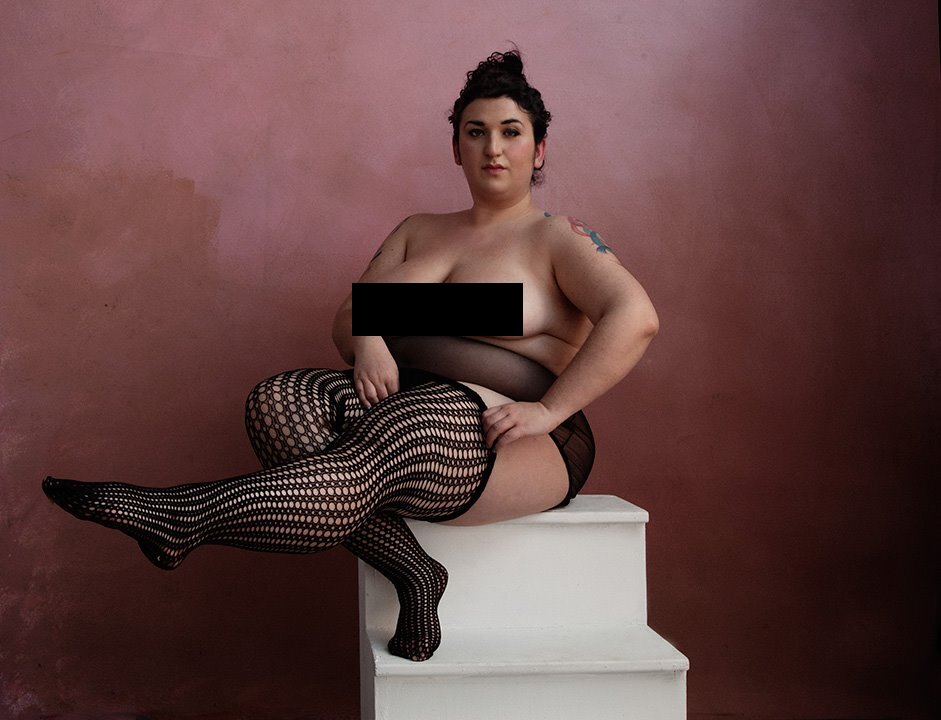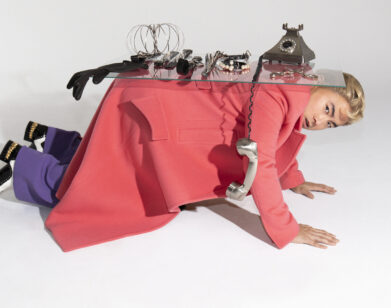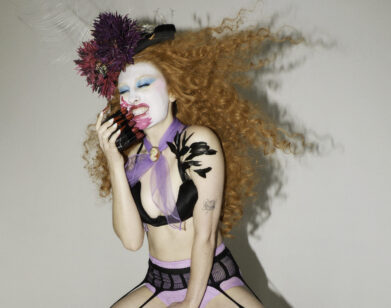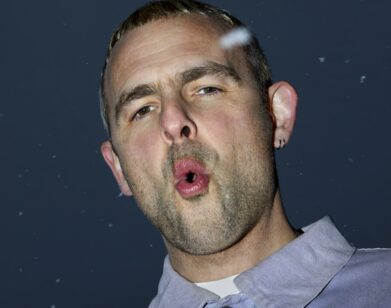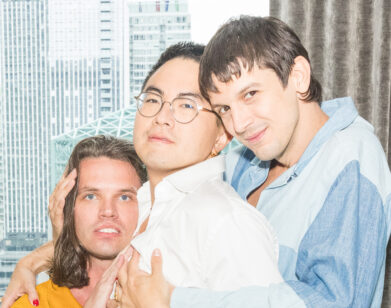naked
Fancy Feast Tells Bowen Yang How to Safely Expel Bodily Fluids
“This is my wedding,” the celebrated burlesque artist Fancy Feast told comedian Bowen Yang about completing her new book, Naked: On Sex Work, and Other Burlesques, a collection of no-holds-barred essays about her experiences in the sex industry published this week. After an accomplished career in the entertainment sphere, including a variety show series, Fuck You Revue, and tangents in sex ed and social work, the pastied performer is now a published author, though she isn’t sure she’ll let her parents read the book (in Naked, after all, orgies and sex shop misadventures abound, alongside Fancy’s insights on fatphobia and respectability politics). Yang, for his part, most enjoyed the author’s tales of erotic counter-transference. “I was so moved, affected, and horned up by the part of the book where you develop a really gorgeous romance with someone that you were talking to as a phone sex operator,” he told Fancy, who got a chance to show the SNL veteran the bobblehead her father had specially made to commemorate her literary debut. On Zoom last week, the two longtime New Yorkers discussed everything from slutty social workers to getting your dick sucked on demand.
———
FANCY FEAST: How was Europe?
BOWEN YANG: It was fun. It was my first time in Berlin. Have you been before?
FEAST: I haven’t. I feel like intergenerational traumas kept me away from Germany, but Berlin is the shit.
YANG: It’s the shit, and it has this paradoxical thing where it transcends the history of the place and also honors it. It’s just a very bizarre place, and I say that without any pejorative connotation.
FEAST: Did you have any misadventures while you were there?
YANG: It was pretty wholesome. We went to a bar where you had to take your shoes off and everyone was just lying on rugs. There were no chairs.
FEAST: Is it a foot thing or not necessarily?
YANG: Oh, it could have been a foot thing. Anyway, congrats on the book.
FEAST: Thank you so much for reading it.
YANG: Of course. It’s excellent. Now that you have another job title in the mix, because you’ve worked in a lot of different capacities, is this just another hellish addition to your tax season paperwork?
FEAST: Yes. My dad used to work for the IRS—another Jewish tale, right? So I like to keep him sharp. He has to set aside several weeks for my particular garbage.
YANG: How much do you have to claim in tips and stuff? I always wonder about that.
FEAST: I mean, with cash… am I saying this on record? I claim every dollar.
YANG: Do you have to keep a list of all your gigs?
FEAST: Nowadays, a lot of gigs have moved away from cash, so there’s a paper trail and I don’t have to be as meticulous, but I used to write everything down in a notebook. If someone had told me that part before I considered a job in nightlife, it would’ve given me pause.
YANG: But you’ve made it this far and there’s no going back.
FEAST: Yeah, there’s something to adding another really mediated role to my work that inspires projection but is a performance of authenticity rather than authenticity itself.
YANG: I feel like the thread in this book was that every circle is concentric. Every circle that you’ve inhabited in your life has fit snugly into every other circle. Does that seem accurate?
FEAST: It’s a really nice way to talk about my identity crises, but it’s about truth and untruth. You get a shape of the thing not from the actual filled-in sense of it, but from all the vectors that point across it and gesture at the shape.
YANG: Oh my god. This is like Photoshop shit. To create the shape, you have to create fixed points and direct the vectors along those points, and that is exactly what’s going on within the book.
FEAST: Does that feel true to how you work?
YANG: Yeah, definitely. Although my whole pathway has been so weirdly compartmentalized into different things. I feel like the pipeline for you from retail sex shop to burlesque to social work makes total sense.
FEAST: I followed the sluts and that’s where the sluts were going.
YANG: There do be sluts in social work.
FEAST: Oh, there certainly do. They’re in the sexuality courses or angrily raising their hands during the policy classes.
YANG: I don’t know if you guys talk amongst yourselves about this, but you do live as Jedi where you cannot cross these hard red lines, and I am going to go on the record and say that I am deeply attracted to my therapist and maybe it’s going to be a problem.
FEAST: I mean, I’ve definitely worked with clients who had sexual feelings for me and disclosed it in session, and it’s wonderful. One of the schools of thought on this is that you’re supposed to create an attachment with your therapist that is a more functional attachment than the ones that we had in our childhood. So any sense of transference, which is the subconscious wishes that are projected onto the therapist, is an indication that that relationship is working. Why wouldn’t you eroticize a person who listens to you and is patient and loving?
YANG: It’s the counter-transference on the therapists that I’m curious about. How does this compromise their work?
FEAST: Right. The juicy stuff is the erotic counter-transference, sexual wishes that are projected back onto the clients. That’s the stuff that therapists have a harder time talking about.
YANG: I was so moved, affected, and horned up by the part of the book where you develop a really gorgeous romance with someone that you were talking to as a phone sex operator. Did it take any internal convincing to write about that?
FEAST: That was actually the last essay that I wrote for the book [during the pandemic]. It was one of those essays that fell out all at once. Because I had not had a resolution with the person I had fallen in love with, it was a way to process my deepest wishes for where that could have gone.
I felt very Jane Austen.
YANG: The context of the pandemic is pretty important because you haven’t seen or touched anyone in so long.
FEAST: Being single during the pandemic was a different kind of single. I felt very Jane Austen. I was embroidering, I was walking in the park. It made touch so insane. I remember getting electrolysis, not even an erotic touch, but just having this gentle, professional trans woman touch my body in order to put an electrified needle in it, and I was like, “I feel everything.”
YANG: I probably felt horny for whoever gave me my first vaccine.
FEAST: I think it’s sort of resensitized me after so many years in the sex industry.
YANG: Is there a toggle between pre and post-pandemic burlesque vibes for you?
FEAST: Yeah, audiences are different now. They don’t rush to be touched or interacted with. They’re tipping less and we’re going cashless. I have a set of pasties that accept Venmo. You just rub your card on my titty.
YANG: That’s amazing. Wow.
FEAST: I want one where you swipe my butt crack. I’m working on it.
YANG: Or just, “Insert chip here,” and pick a hole.
FEAST: Exactly. And hopefully for more than $1. I feel like we must get away from the $1 payments.
YANG: I think there’s something to react to in terms of, I’m not even sure if it’s millennials or Gen Z, but the “sexless generation.” There’s a whole thing on TikTok where teens are like, “Don’t hold hands in front of me. I didn’t consent to that.”
FEAST: I was just talking to my friend about how every generation kind of reinvents fascism for itself. Growing up in the greater cultural Limp Bizkit, Woodstock ’99 soup, there was a lot of aggression as the dominant mode of communication rather than sexuality, but sex then was kind of lurid and not consensual. Gen Z has not been served well by growing up in this time where nothing feels safe or okay, so they internalize that.
YANG: That’s a pretty good underpinning for it. Are you saying that we should be grateful for Limp Bizkit?
FEAST: Woof. One of my earliest performances was a lip sync to “Nookie” at my middle school. I wore the hat and the khakis, so it was maybe my first drag.
YANG: Incredible. Your first drag persona was Fred Durst?
FEAST: Yeah, and then I was like, “Maybe a life in the arts is for me.”
YANG: And your first true channeling of queerness was through that man.
FEAST: I took the cookie, I stuck it up my… yeah.
YANG: I’ve always loved your name, and I’ve heard you talk about how it’s a wink at the way we sexualize cats, especially in burlesque culture. What is your cat food brand of choice for your pets?
FEAST: Thank you for asking the hard-hitting questions. Unfortunately, it’s not my choice, and Agatha likes the garbage from the bodega. I keep trying to get all of the brands that are grain-free and she doesn’t give a fuck. She basically wants to eat Lucky Charms. I don’t even know what the brand is because I pretend I do not see it.
YANG: Isn’t it so crazy that animals prefer the processed shit just like human beings do?
FEAST: My baby loves her cornmeal and so do I.
YANG: Love that. I really have only had the pleasure of seeing you do burlesque once at my show and it was incredible. You talk about work night versus family night in your book. That was a work night, right?
FEAST: Well, the work was different from what’s described in the book. The work was being in a room with a bunch of professionally funny people who I was trying to impress, and I’m so concerned about being embarrassing that I end up going in the opposite direction. You or Patti Harrison would be playing and someone would ask me a question and I’d be like, “The ocean currents are changing and there’s far fewer owls in the world.” Like, shut the fuck up and put on your glitter. But my goal has never been to perform just for the people who are most likely to receive what I’m doing. The true test of my ability is to communicate to audiences that are not inclined to receive me well, and that’s where a lot of those work nights happen.
YANG: That is so refreshing. We all need to be in rooms where our stuff won’t necessarily play at the hit rate we want them to.
FEAST: I don’t know. If you can get your dick sucked, why not?
YANG: At this point, getting your dick sucked is like ordering delivery. It’s on demand. I have been too accustomed to receiving things when I want them. Although if someone comes up to you after a show like, “You know what you can do better?” It’s like, “Fuck you. I don’t want to hear that.”
Getting your dick sucked is like ordering delivery.
FEAST: Oh, I never want to hear that. No, thank you. What I like is not just when people like my work, but when they feel seen or challenged or moved by it. I know this is your interview, but how does your family receive your work?
YANG: There are a million cultural barriers there, but I feel like they’re just making sure I’m not completely embarrassing myself. I don’t care, I would love to embarrass myself completely. What about you? The way you write about your family, it’s like they seem to get it.
FEAST: They get some things. I think the book has really been a test of that. There are some things that they’ve known about my life that are made so much more explicit in the book, and I feel like a lot of it sort of falls under a parent’s right not to know. I’ve redacted a lot of my life, and now here it is. My dad is not sure if he’s going to read the book or not, because it may just not be appropriate. But he did make a custom bobblehead doll of me to sit next to the book in his library. Do you want to see her?
YANG: Oh my god. Who made that? That’s perfect.
FEAST: I guess Royal Bobbles is the name of the company. Now I have a little doll of myself who looks at me on my bookshelf.
YANG: This actually leads me perfectly to something I wanted to ask you. I love that you wrote about disenfranchised grief. You write about how there are things in your life that are sad, but that are not acknowledged by society, so it’s hard to gauge your response. This feels like a perfect example. There’s no socially accepted way of celebrating this bobblehead.
FEAST: For me, I don’t know if I intend to get married and I definitely don’t want to have kids. So how do we celebrate accomplishments in adulthood that aren’t connected to the traditional sense of building dyads and families and amassing social power? I don’t expect it to be legible in the same way to everyone else, but this is my thing. This is my wedding.
YANG: I’ve had friends in the past get jobs or achieve goals and say, “This feels more exciting than being engaged.”
FEAST: And unfortunately, I feel like the model that we have for that is season 2 Carrie Bradshaw, “I’m getting married to myself, buy me Manolos.” That’s what we’ve got. I think the goal with my stage work as well as with the book is to have people thinking they’re coming in for one kind of experience and walking away with another. So hearing that the idea of disenfranchised joy is really exciting.
YANG: Of course. I’ve never gotten the chance to ask you about any of these things, so this feels like a nice arrangement over Zoom and in a magazine.
FEAST: Well, I’m glad for it because otherwise just running into each other when you’re headed to Barry’s Bootcamp—
YANG: Wait, did that happen to us? I was on my way to Barry’s Bootcamp?
FEAST: You were. Are you still a Barry’s man?
YANG: No. Well, I should be. But I can’t do it. It’s too much.
FEAST: I feel like emotionally I’m not set up for it because they yell.
YANG: Actually, they’re quite nice, it just feels like you’ve been put through a meat grinder.
FEAST: I do have a question for you, actually. Since a lot of the book has to do with different sections of New York nightlife, were any of the places familiar to you?
YANG: Oh, definitely. Slipper Room, of course. You gave me a really specific sense of place with a lot of the sex parties and the orgies. You did specify neighborhoods, right,
FEAST: I anonymized.
YANG: That’s so classy. Burlesque feels like a blind spot for me in nightlife. The thing about New York is that your field of vision is never quite as expansive as you think it is.
FEAST: Absolutely. When you were talking about taking your shoes off and laying down on the carpet in Berlin, my first thought was, “Did you ever interact with Kevin Carpet?”
YANG: I’ve only heard the legend of Kevin Carpet. Have you?
FEAST: Accidentally stepped on him, yes.
YANG: Which feels like the best way to discover him.
FEAST: Underfoot, I suppose, as he would’ve wanted.
YANG: What shoe were you wearing? Did he make a sound? Did you make a sound?
FEAST: It was a sneaker, which I don’t think is his preference. It was some sex trivia event 13 years ago. The sensation of having my foot touch something that I was anticipating would be hard and instead was body-soft was so atavistically disgusting. So I made an enemy that night. Then, years later, when I was doing the Fuck You Revue, he emailed me to ask if he could be part of the show as an art installation, and he would only charge me 150 bucks. I was like, “I’m not paying you to do this.” I hope people get stepped on in whatever way they most need to, but it’s not going to happen on my dime.
I’ve been a pretty juicy girl.
YANG: Is Fuck You Revue still going on?
FEAST: It’s not back in a monthly sense. I did a monthly show for three years, which was fucking hard. But I got a grant from the Jewish Museum of Maryland to put on a special edition of all Jewish performers at Abrons Art Center this summer co-produced with Zoe [Ziegfeld]. We got Sasha Velour to come in and do the show. It was beautiful.
YANG: Congrats. Is it just going to be an ad hoc thing going forward?
FEAST: Yeah. It’s also just a venue issue. It’s really important to Zoe and I that we have carte blanche to have any number of things coming out of holes. That’s part of our ethos. And there are just fewer and fewer places that will allow us to bleed and piss in their space.
YANG: Speaking of blood and piss, my big takeaway from the book is the power of fluid. I loved reading about your Miss Coney Island performance where there was a splash zone of lube in the audience. How long have you been aware of the spectacle of fluid in your performance?
FEAST: I’ve been a pretty juicy girl. There’s something about that confrontation with obscenity and biohazard that really keeps me connected to punk rock. Seeing early footage of the New York Dolls or the Sex Pistols take a swig and spit it into the audience, that was the coolest thing I’d ever seen. I thought that was an amazing way to be connected on a visceral level. One of my first acts involved doing a fake spit take and spraying people. It gets a reaction, but in the post-COVID imagination, that’s something I’m thinking about really deeply.
YANG: There has to be a way of making that feel okay.
FEAST: I mean, are we going to go Gallagher and give them raincoats? I did do an act as Gallagher, now that we’re talking about him, and I did smash a watermelon with a sledgehammer and I could still see seeds on the ceiling years after.
YANG: Not to use this overused word, but I mean, Gallagher is iconic.
FEAST: It’s unfortunate the other stuff that he also said subsequently. I don’t want to be like, my roots are Limp Bizkit and Gallagher, and that’s it.
YANG: I take it back. But I really think that if anyone were to reinvent and innovate fluid in performance, it is you and the whole burlesque community. Within comedy, the innovation is very visually static. I feel like the beautiful name of burlesque and the way that society accepts it differently from club stripping makes it more easily digestible to deliver something like the fluids.
FEAST: What do you think it would take for comedy to adopt fluids and which fluid do you think would be the first to be adopted?
YANG: Well, speaking of Patti Harrison, she’s doing a show right now called “My Huge Tits Huge Because They’re Infected Not Fake!” She comes out in a giant breast plate with two huge tits that she pre-fills with stage blood. I don’t want to give too much away, but that’s the Chekhov’s gun. She’s one of our great minds, as we both have seen firsthand. I feel like I’m spoiled rotten at my job where I get to have an idea, call up the appropriate department, and be like, “Can we have a wig that’s 20 feet long?” And they make it. I’m really holding some gratitude for that because I have the opportunity to use fluids at my job, and yet I have not exploited that opportunity.
FEAST: So you haven’t done the puke thing yet?
YANG: I want to, but so many people have done it in the past and I gotta give it some time before it feels fresh again.
FEAST: You have to lay fallow in the field before you puke again.
YANG: Yes. This is my fallow period where I just stand completely still and I say what I think are jokes.
FEAST: I mean, I can’t really think of a more charming place to end.

